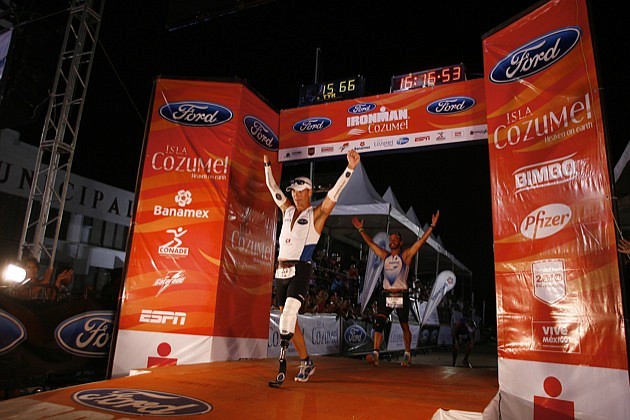- January 2, 2025
-
-
Loading

Loading

JASON GUNTER
Business: Jason L. Gunter, P.A.
City: Fort Myers
Age: 46
Fitness goal: Return to Kona, Hawaii, to compete in the Ironman World Championship a second time.
How he started: Gunter's right arm and left leg were amputated in a boating accident in Pine Island Sound on Aug. 15, 1992. In early 2009, to regain fitness he lost, he bought a prosthetic running leg. “I started in my parking garage because I was afraid and embarrassed,” he says. He started by running from one parking spot to the next, then gradually progressed to several miles.
How he got to Kona: On a whim, Gunter entered the Ironman World Championship lottery in early 2009, which guaranteed five entries to disabled athletes from all over the world to compete in Kona, Hawaii. Despite such slim odds, officials pulled Gunter's name. “I had five months to train,” Gunter chuckles, looking back. “I've always taken huge challenges. I'm never satisfied.”
How he trained for Kona: “That was a tough time for me,” Gunter says. The training was grueling because of the challenge: a 2.4-mile swim, followed by a 112-mile bike ride and finishing with a 26.2-mile run. “I had a coach and people helping me.” But the fear of failure is what drove him and kept him from pulling out of the race.
How he deals with setbacks: Gunter collapsed at Kona at mile 23 of Ironman's run segment, just three miles shy of the finish line. If he had finished, he would have been the first double amputee to successfully finish the race. Since then, another man has accomplished this feat. “That was a very difficult time for me,” Gunter says. “In my mind, I wanted to be an Ironman.” To overcome that disappointment, Gunter signed up for another Ironman. In 2010, Gunter completed the Ironman Cozumel in 16 hours, 16 minutes.
Key to success: Consistency and segmenting. Competing in an Ironman race can be overwhelming, so Gunter plays tricks with his mind by breaking down the race into segments. For example, he'll think only of racing to the next aid station or telephone pole.
How he finds time to train: A night owl, Gunter works late into the evenings and trains in the mornings, usually between 7 a.m. and 10 a.m. He specializes in labor and employment law and leaves emails with assignments for his assistant to begin working on in the morning. Gunter keeps his bike at work and always carries goggles so he can squeeze in a swim during the day. Saturdays and Sundays are his big training days. Weekends might include a 100-mile bike ride and a 20-mile run at the peak of training. Besides, exercise is a good time to think through work problems. “If I have a presentation, I run it through my mind,” he says.
How he relaxes: If he needs it, Gunter will take a short nap. “I have a couch in my office,” he says. Once every two weeks, a massage therapist comes to his office to give him a sports massage while he watches politics on a big-screen television. “I do have pain in my amputated limbs,” he says, but otherwise Gunter doesn't experience joint pain. “That's just genetics,” he suspects.
How he stays motivated: Gunter trains with triathlon and running clubs in town. “You've got to have training partners,” he says. These partners keep you motivated and accountable. “We all have our excuses, and I have major ones,” he says, holding up his amputated arm. “We use those excuses to make decisions we want to avoid.” His advice: “Face those fears.”
What gadgets he uses: Gunter doesn't wear an iPod when he's training, preferring to mull work-related issues instead. He tracks his efforts with a GPS-enabled Garmin 305 watch.
How he fuels his training: Gunter drinks Gatorade, but he doesn't consume many solid foods while he's running or biking. He'll cut up some PowerBars into bite-sized chunks and put them in his pockets, if he needs them. Otherwise, he eats an ordinary diet of protein (steak and chicken), complex carbohydrates, vegetables and eggs. His weaknesses: chocolate, sweets and French fries. Gunter weighs 165 pounds on his 6-foot frame.
How much it costs: Besides the $600 to $700 entry fees for Ironman races, Gunter says he's spent $10,000 for his Trek Speed Concept 9.9 carbon fiber bike and three prosthetic running legs that cost $12,000 to $13,000 each. The racing prosthetic legs are custom-made by ProCare, a Georgia company. Because he's attracted national media attention, Newton, the athletic shoe manufacturer, sponsors Gunter and provides him with free shoes and apparel.